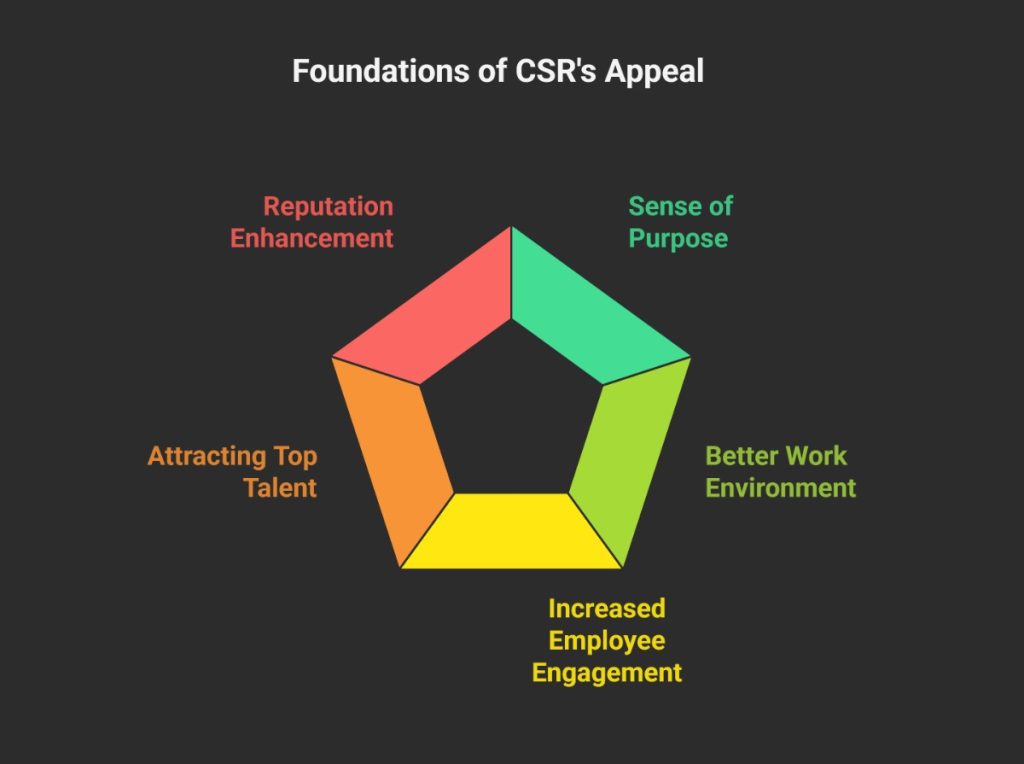
In today’s competitive job market, attracting and retaining top talent is a significant challenge for companies. While salary packages and benefits are essential, they’re no longer the only factors that determine a candidate’s decision to join a company. Increasingly, top performers are looking for more than just a paycheck; they’re seeking a sense of purpose and fulfillment in their work. This is where Corporate Social Responsibility (CSR) values come into play.
What are CSR Values?
CSR values refer to a company’s commitment to operating in a socially and environmentally responsible manner. This includes initiatives such as reducing carbon footprint, promoting diversity and inclusion, supporting local communities, and adhering to ethical business practices. Companies with strong CSR values prioritize not only their shareholders but also their stakeholders, including employees, customers, and the environment.
The Rise of Purpose-Driven Professionals
Gone are the days when employees were solely motivated by financial rewards. Today’s top talent is driven by a desire to make a positive impact in the world. They want to work for companies that share their values and contribute to the greater good. A study by Cone Communications found that 74% of employees say their job is more fulfilling when they are provided opportunities to make a positive impact at work.

Why Top Talent Chooses Companies with Strong CSR Values?
So, what makes CSR values so attractive to top performers? Here are some compelling reasons:
1. A Sense of Purpose
When companies prioritize CSR, they demonstrate a commitment to something larger than themselves. This sense of purpose resonates deeply with employees, who feel proud to be part of an organization that makes a positive difference. For instance, companies like Patagonia and REI have built their brands around environmental sustainability, inspiring employees to work towards a common goal.
2. Better Work Environment
Companies with strong CSR values often have a more positive work environment. They prioritize employee well-being, promote work-life balance, and encourage volunteerism. This, in turn, leads to higher job satisfaction, reduced turnover rates, and increased productivity. Google’s employee-centric CSR initiatives, such as its famous 20% time policy, have contributed to its reputation as a great place to work.
3. Increased Employee Engagement
When employees feel connected to their company’s CSR values, they’re more likely to be engaged and motivated. A study by Gallup found that employees who are engaged in their work and workplace are 26% more likely to stay with their current employer.
4. Attracting Top Talent
Companies with strong CSR values are more attractive to top performers. A survey by LinkedIn found that 64% of professionals consider a company’s social and environmental commitments when deciding where to work.
5. Enhanced Reputation
A strong CSR program can significantly boost a company’s reputation. This, in turn, can lead to increased brand loyalty, improved customer relationships, and access to top talent. Companies like The Body Shop and TOMS have built their brands around social and environmental responsibility, earning them a loyal customer base.

Pain Points: Challenges of Implementing CSR Values
While the benefits of CSR values are clear, implementing them can be challenging. Some common pain points include:
- Lack of Resources: Small and medium-sized enterprises (SMEs) may not have the resources to dedicate to CSR initiatives.
- Resistance to Change: Some employees may resist changes to traditional business practices.
- Measuring Impact: It can be difficult to measure the impact of CSR initiatives.
Solutions: Overcoming CSR Challenges
To overcome these challenges, companies can take the following steps:
- Start Small: Begin with simple, low-cost CSR initiatives that can have a significant impact.
- Communicate Effectively: Clearly communicate the benefits and goals of CSR initiatives to employees and stakeholders.
- Set Measurable Goals: Establish clear metrics to measure the impact of CSR initiatives.
Best Practices for Implementing CSR Values
To get the most out of CSR values, companies should:
- Integrate CSR into Company Culture: Make CSR a core part of company culture, rather than a peripheral initiative.
- Involve Employees: Encourage employee participation and feedback in CSR initiatives.
- Be Transparent: Regularly report on CSR progress and challenges.

Frequently Asked Questions (FAQs)
What are CSR values?
CSR values refer to a company’s commitment to operating in a socially and environmentally responsible manner.
Why are CSR values important?
CSR values are important because they demonstrate a company’s commitment to something larger than themselves, inspire employees, and contribute to the greater good.
How can companies implement CSR values?
Companies can implement CSR values by integrating them into company culture, involving employees, and being transparent about their progress and challenges.
Read More
How CSR Builds Customer Loyalty and Trust?
Why Every Company Needs a CSR Strategy in 2025?
How to Make NGO More Appealing to CSR-Focused Companies?
Conclusion
In today’s competitive job market, companies need to do more than just offer a salary package to attract and retain top talent. By prioritizing CSR values, companies can demonstrate their commitment to something larger than themselves, inspire employees, and contribute to the greater good. Whether you’re a small startup or a large corporation, incorporating CSR values into your company culture can have a significant impact on your reputation, employee engagement, and bottom line.
